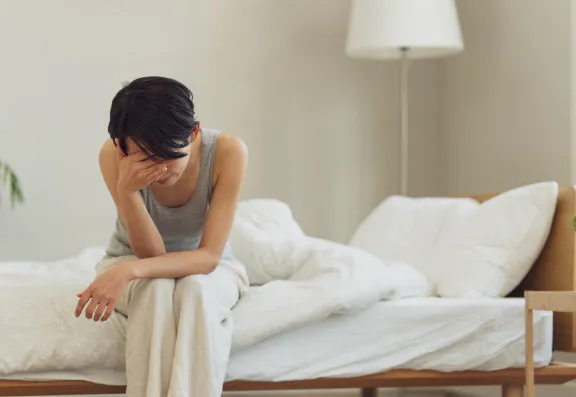Menopause can really take its toll on women’s mental health, leaving some feeling extremely low and anxious. If you are struggling, don’t be scared to try different coping strategies and seek support from your GP.
Menopause is when a woman has not had a period for 12 months in a row. A decline in hormone levels means that the ovaries will stop producing eggs each month, so marks the end of a female’s fertile years. The time leading up to the menopause is known as perimenopause. During this period, it is normal for hormone levels to fluctuate leading to a number of menopausal symptoms.
Throughout perimenopause and menopause, it is normal for a woman to experience multiple physical changes, which include irregular periods, difficulty sleeping, headaches and migraines that are worse than usual, dry skin, hot flushes, night sweats, weight gain, muscle aches and joint pains, vaginal dryness and pain, discomfort during sex and urinary tract infections.

Unfortunately, it’s normal to experience brain fog, memory loss, anxiety, depression, reduced sex drive, tiredness, lack of motivation, loss of confidence, stress, anger, irritability and other emotional changes when you are going through menopause.
The change in your hormone levels leads to emotional and mental changes during menopause. If you have a pre-existing mental health issue, such as depression, bipolar or schizophrenia, it can worsen and become more prevalent at this time in your life.
If you’ve tried non-medical options and are still struggling, or want a quicker fix, then medication can help.
Hormone replacement therapy (HRT) is the most common option as it will help to regulate your hormones, which should calm mood swings and mental challenges.
You could also try cognitive behavioural therapy (CBT), also known as talking therapy, whereby you can speak to a mental health professional who will help you think more positively about your life and support you to set goals to make improvements.
If you are struggling with depression and anxiety, then taking a course of anti-depressants can help. Speak to your GP about the best options.
As always, if you have any questions you can use our Menopause Q&A where you can ask for more advice.
We have lots of Menopause FAQs, Menopause videos, Menopause reviews, and Menopause before and after images for you to do more research.
If you want to look for your nearest verified Menopause clinic, your local menopause clinics are listed below.